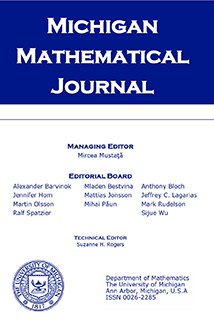Abstract
We investigate the problem of when big mapping class groups are generated by involutions. Restricting our attention to the class of self-similar surfaces, which are surfaces with self-similar ends spaces, as defined by Mann and Rafi, and with 0 or infinite genus, we show that when the set of maximal ends is infinite, then the mapping class groups of these surfaces are generated by involutions, normally generated by a single involution, and uniformly perfect. In fact, we derive this statement as a corollary of the corresponding statement for the homeomorphism groups of these surfaces. On the other hand, among self-similar surfaces with one maximal end, we produce infinitely many examples in which their big mapping class groups are neither perfect nor generated by torsion elements. These groups also do not have the automatic continuity property.
Citation
Justin Malestein. Jing Tao. "Self-Similar Surfaces: Involutions and Perfection." Michigan Math. J. 74 (3) 485 - 508, July 2024. https://doi.org/10.1307/mmj/20216114
Information





